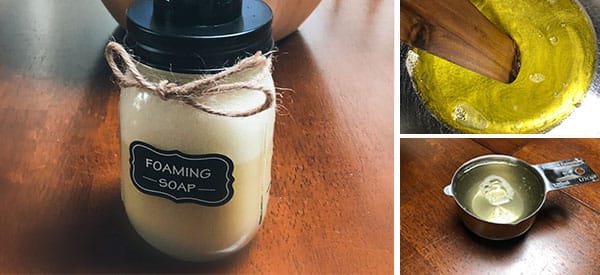
How to Make a Healing Soap for Eczema and Skin Rashes
Eczema flare-ups are such a pain in more ways than one. And if you are one of the 30 million Americans with eczema, you might also be spending a small fortune on expensive creams and soaps yet, still finding little relief from itchy, irritated skin.
If you are one of those people or care about one of those people, this article is for you. I am going to tell you how you can use a few simple plant-based ingredients at home to make an effective eczema relief soap.
What is Eczema?
First, there is a big difference between what causes eczema and what causes eczema symptoms. The symptoms of eczema are the redness, flaking, and irritation you feel during a flare-up of the condition itself.
Eczema is an umbrella term for different types of dermatitis, but more often than not, you’re dealing with atopic dermatitis. Dermatitis is an inflammatory disorder which means there are underline causes.
Researchers have already established that gut issues like Leaky Gut Syndrome and others are often associated with eczema. Recently, a study in the Journal of Allergy and Immunology said that eczema or atopic dermatitis is an autoimmune reaction. This explains why those expensive eczema treatments only work temporarily.
Like any ailment with an underlying issue, you can soothe the symptoms of eczema with topical treatments (like this fantastic herbal eczema soap), but getting the condition under control long-term could require some deeper work.
There are several things known to cause flare-ups:
- Soaps
- Foods
- Cleaners
- Laundry detergents
- Fragrances
- Disinfectants
- Stress
- Nutrition deficiencies
However, many medical professionals are still unaware of the underline causes of eczema, so this may be one we have to find ourselves. It’s a good thing we have herbs! So let’s look at what’s going into this homemade eczema soap recipe.
Chamomile is probably one of the most well-known and oldest medicinal herbs. It’s commonly used in cosmetics and is known to soothe inflammation and repair the skin. In a double-blind, randomized study, a cream made of chamomile was compared with 0.5% hydrocortisone cream and a placebo cream in patients with atopic eczema. After two weeks of treatment, the chamomile cream showed a slight superiority over 0.5% hydrocortisone and a marginal difference compared to the placebo.
Calendula is a mild herb used for centuries to calm skin inflammation. Calendula is safe enough for babies, yet it’s naturally antibacterial, antimicrobial, and anti-fungal. It’s also super hydrating and can even promote collagen production.
Isn’t lavender great for everything? Just about! Lavender is so widely used because it’s anti-inflammatory, anti-fungal, antimicrobial, and anti-depressant, preventing conditions such as impetigo and MRSA.
Vitamin E is a powerful antioxidant that helps to calm inflammation. Many people know to take oral vitamin E for skin conditions, but adding it to your homemade eczema soap can be just as effective. Vitamin E helps strengthen the skin barrier, protecting the skin from external toxins, and helps hold in moisture.
Castor oil contains a fatty acid called ricinoleic acid — but also oleic acid and linoleic acid. This oil has been around since the days of old and is highly favored in Ayurvedic traditions. Castor oil is anti-inflammatory and has pain-relieving properties. In addition, it’s antimicrobial and can help speed up recovery time. When you use your homemade eczema soap, you’ll feel a silky quality to your skin afterward that can—at least in part— be credited to the castor oil.
⇒ The Natural Wound Healer That Probably Grows in Your Backyard (Video)
Many eczema sufferers already know they can’t use “normal” soaps without having an issue. Castile soap has become the go-to for many and is one of the three base ingredients of this soap. It contains no harsh ingredients and no additives. It’s made from vegetable oils and lye, making it a vegan option as well.
How to Make Herbal Soap for Eczema
You’re going to need these things:
Ingredients
- ½ cup of pure quality castile soap
- ½ cup distilled water
- ½ cup virgin olive oil
- 1 teaspoon of vitamin E oil
- 1 teaspoon of castor oil
- 1 teaspoon of calendula-infused oil
- 20 drops of organic essential lavender oil
- 20 drops of organic essential chamomile oil
- A container or dispenser for your soap.
Directions
Step 1: In a large bowl combine the water and the castile soap.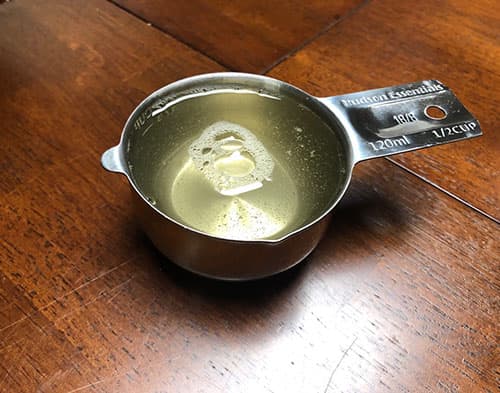
Step 2: Drop 20 drops of each chamomile and lavender essential oil right into the bowl.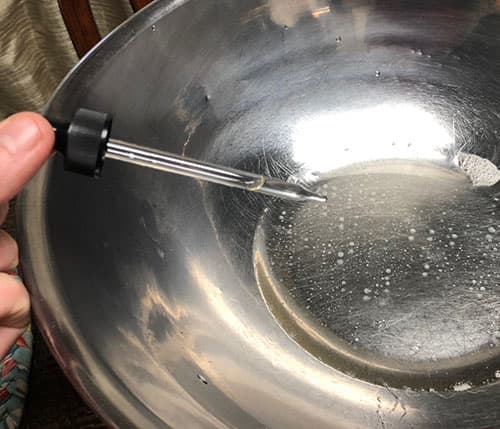
Step 3: Add one teaspoon of each to the bowl: Vitamin E oil, calendula oil, and castor oil.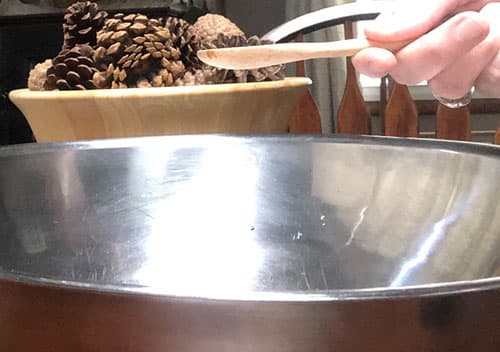
Step 4: Add the olive oil and stir very gently until completely incorporated. The soap mixture will separate as it sits, so you must give it a gentle little shake when you use it. 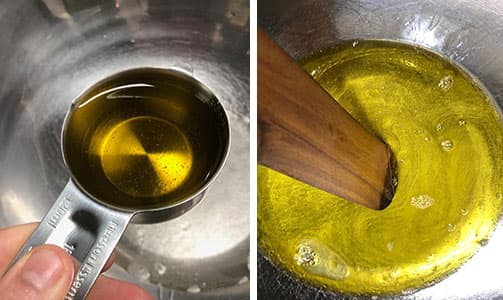
Step 5: Pour the bowl’s contents into a container that is easy to dispense. You can purchase soap dispensers readily online. 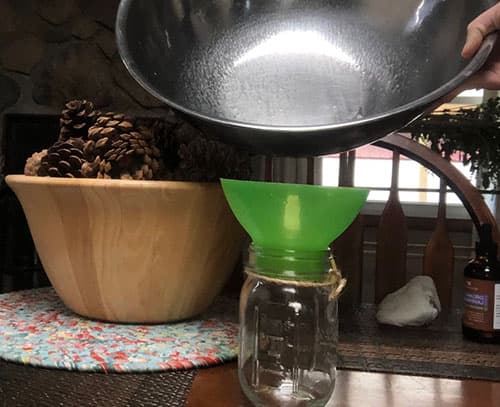
Step 6: If you are using a soap dispenser, place the pump lid on top of your container.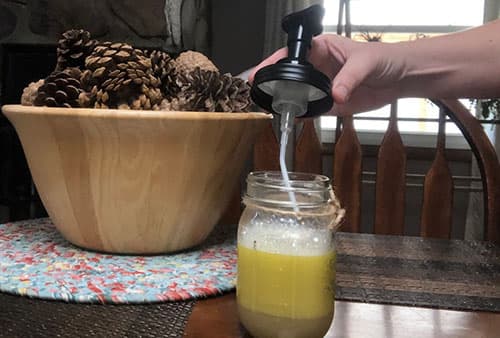
And you’re done! I really love using a foaming soap dispenser for this soap.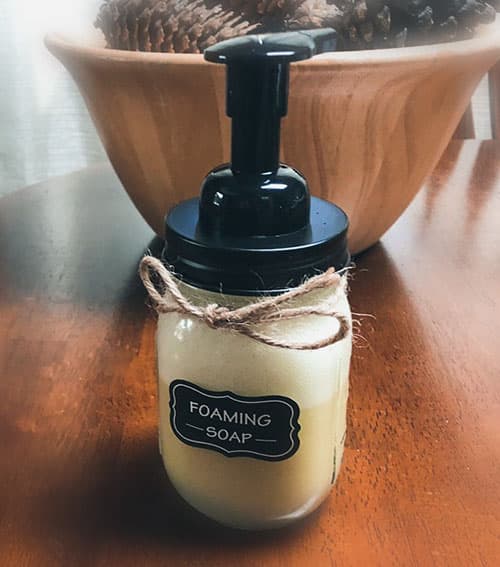
How to Use
Place your soap where it can easily be used by eczema sufferers. This stuff smells amazing! You immediately feel a soft coating on your skin after use. Once your skin dries, there is no sticky residue leftover, just moisturized and protected skin.
This herbal eczema soap is mild and gentle enough to use on children. It should last a couple of weeks on the counter, but you probably won’t have any problems using it up.
You can also add other essential oils and change the scent. But it would be best if you research first, to ensure that whatever essential oils you use won’t make your eczema worse. Happy mixing!
You may also like: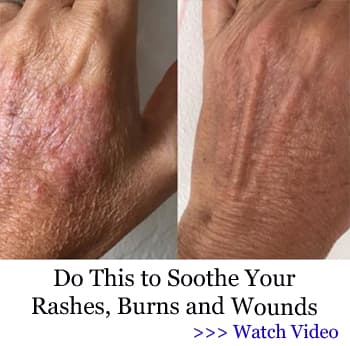
DIY Anti-Microbial Laundry Soap
The Herbal Salve That Can Save Your Skin (Video)
How to Make Stinging Nettle Shampoo For Hair Growth

Just a note here from an experienced soap maker…. because water is added to make this liquid soap, bacteria will grow. This liquid soap will be fine for a while, but mold will eventually rear its ugly head. The only way to prevent this is to add a preservative. If you don’t want to use a preservative, just make a smaller batch and when that’s used up, make a fresh batch.
What if one uses distilled water ?
Hello Siena,
Thank you for your post! We are extremely grateful for your advice.
Many blessings and good health!
Which preservative do you recommend using?
I will try this
Hello Rose,
It’s nice to hear you’ll try the recipe. We would love to know if you are content with the finished product and if it works for you.
Many blessings and good health!
Just wanted to add an asterisk to this recipe: lavender is a known endocrine disruptor and should not be applied topically nor ingested if you want to avoid the problems that might come with it – like breast cancer.
Source for those interested: book Estrogeneration by Dr. Jay
Hello Nayara,
Thank you for the book recommendation.
According to an NCBI study, lavender oil may have hormonal impacts on girls’ early breast development. Additionally, it found that it might be interfering with both estrogen and androgen. In both men and women, they can result in hormonal imbalance.
Many blessings and good health!
We must be aware that big pr@rma will try and deter people from using natural healing. They have been doing it for years. I researched what you said and found that this information on Lavender and Tea Tree oil is not substantial. Here is the site info
https://earthmamaorganics.com/blogs/news/how-lavender-and-tea-tree-became-labeled-as-endocrine-disruptors/
I would reseach who Dr Jay is…. he may be giving out false information to sway people from using something that is beneficial, because he works for Big ph@rma. I am learning just how bad this has become. There are some real bad disinformation out there! Its so sad really!
Good article
Would this also work for psoriasis? Or is there another recipe for that?
Hello Cheryl,
Thank you for your question. Yes, this soap is beneficial and soothing for psoriasis as well.
Many blessings and good health!
Hi Cheryl
I’ve have it also and I find cutting out sugar and bread greatly improves my condition. It basically goes away but will come back, when I cheat and eat bread. Anything that is anti-viral works great. Some examples would be ginger, tumeric and garlic powder. Sunlight is also great.
Best wishes and good luck from the MYG Cosmetic team!
ps Love the site but not all psoriasis articles come up. Thanks for all the great info sharing. Take care!
Hey
Can we add or combine a 100% natural Shea butter to the healing soap when preparing it instead of water..
That is a great question! Why not try it? Shea butter is fatty; normally, it’s the oils that must be adjusted in a recipe when you use it, so we can only say with re-working the recipe. Castile soap is already very “softening.” However, if you try it, please come back here and let us know what you did, the measurements you used, and how it turned out. I am very interested in your results! 🙂
Can you make a naturel preservative for this soap?
Hello Donna,
Thank you for your question.
Rosemary extract is a good choice for a natural preservative in this soap recipe.
Many blessings and good health!
Do you have a recipe.for the rosemary extract
Can I use coconut oil instead of Castor oil? Or would it set up in a hard form?
Please some clarification.. so I rinse off soap and pat dry or rub into my skin until it all soaked in?